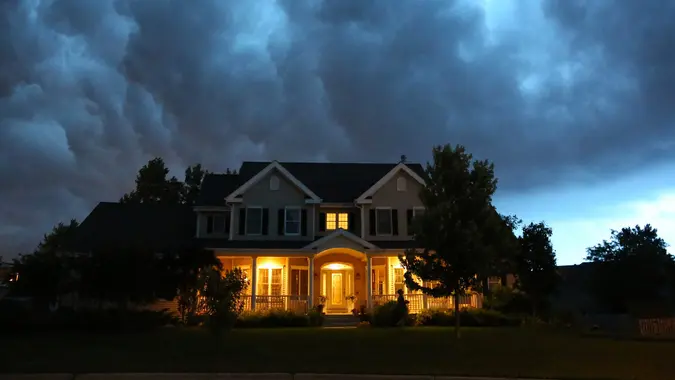Real Estate: Nearly 30% of Americans Would Buy a Haunted House — Is It Worth the Investment?

Commitment to Our Readers
GOBankingRates' editorial team is committed to bringing you unbiased reviews and information. We use data-driven methodologies to evaluate financial products and services - our reviews and ratings are not influenced by advertisers. You can read more about our editorial guidelines and our products and services review methodology.

20 Years
Helping You Live Richer

Reviewed
by Experts

Trusted by
Millions of Readers
High prices, diminished inventory and rising interest rates are the terrifying truths in today’s housing market that are forcing prospective owners to compromise when it comes to buying their dream home. In fact, some buyers are willing to venture into nightmare territory and purchase a haunted house if it satisfies all their requirements.
The spookiest day of the year is upon us, and Zillow is already into the spirit of Halloween. According to the real estate marketplace’s new survey, 67% of potential home buyers could be persuaded to buy a haunted house if it had the right features, was in a favorable location or was available at a great price.
Per the survey, 40% of respondents said they could be swayed to buy a haunted house if it had features they desire, like a big backyard, a pool or a two-car garage. Meanwhile, 32% said the same if the home were in their preferred location.
Moreover, nearly 30% of respondents said they would be more likely to buy a home if they knew it was haunted (29%), and 20% claimed that the presence of ghosts wouldn’t affect their decision to buy.
How times have changed. As Moneywise noted, a 2020 Realtor.com survey found that 62% of Americans said they wouldn’t consider living in a house that was reported to be haunted. And, according to a survey by (appropriately) Real Estate Witch, 40% of those asked wouldn’t buy a haunted house under any circumstances whatsoever.
While a haunted house can bring plenty of nervous excitement to a neighborhood, the stigma surrounding a home with a history — whether true of not– can result in a lowering of value or a tough sell for real estate agents. Residents can be very wary of haunted houses, and sellers in some states have to disclose whether a house is haunted to satisfy clients’ fears.
While Zillow reported that inventory is slowly increasing, it’s still down more than 10% from last year, and more than 40% lower than 2019 levels. With the housing market being so out of control, buyers have no choice but to consider any available house.
However, if a house is considered “stigmatized” in the real estate industry, you likely won’t have to pay top dollar for it. Unnatural deaths and alleged hauntings can drop a home’s price significantly, said Randall Bell, sometimes known as “Dr. Disaster,” a top property damage economist and expert on stigmatized buildings. Bell estimated that if a murder took place in a house, it can result in a 10% to 25% loss in value.
“Despite these chilling conditions, life events like job changes, coupling up and having children still drive households to buy,” said Manny Garcia, a senior population scientist at Zillow. “These shoppers have to square their budgets with important home characteristics like bedrooms, bathrooms and floor plans.
“When balancing so many priorities in an inventory-starved market, avoiding ghosts and ghouls doesn’t always make the cut,” Garcia added.
 Written by
Written by  Edited by
Edited by 

























